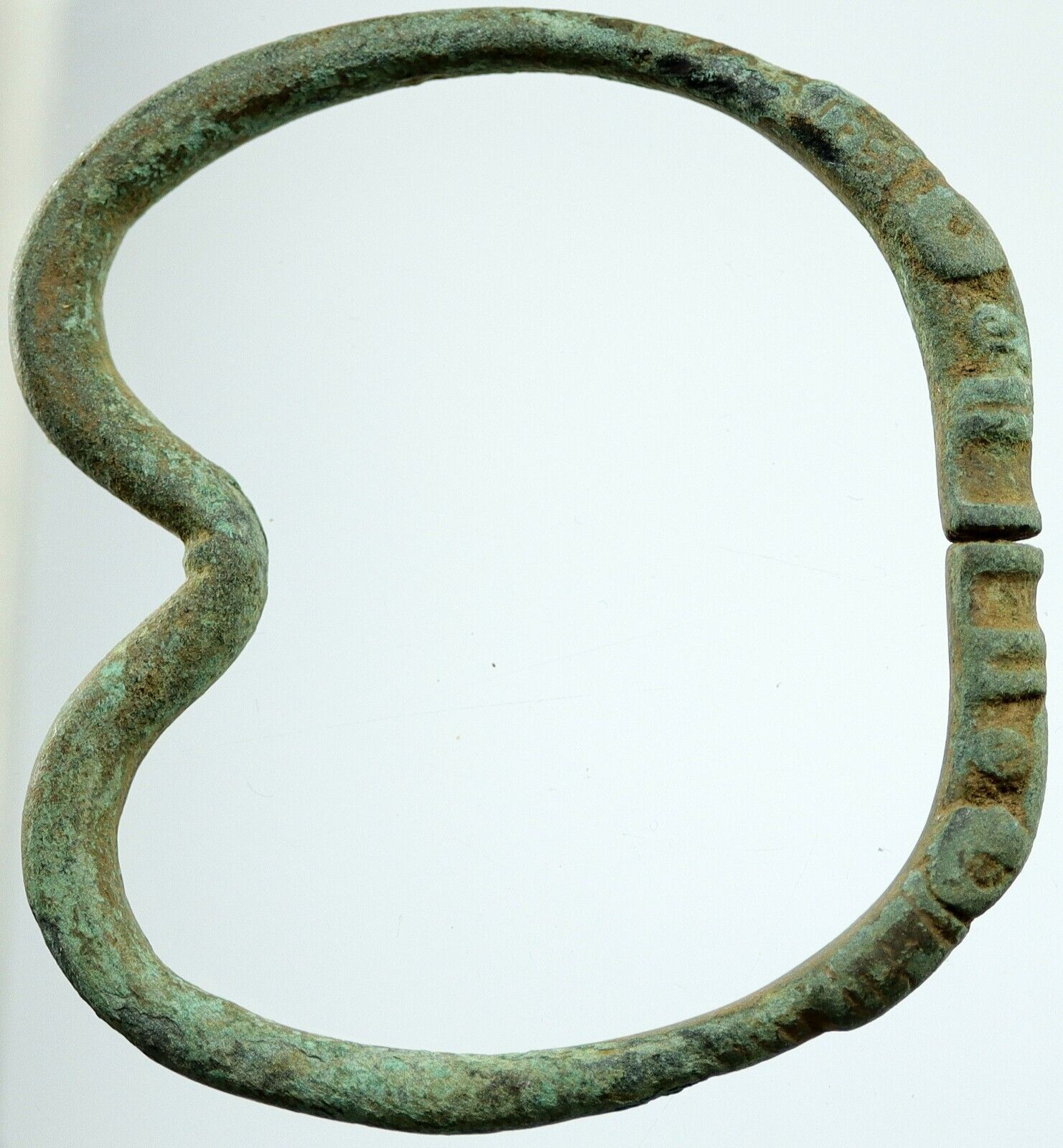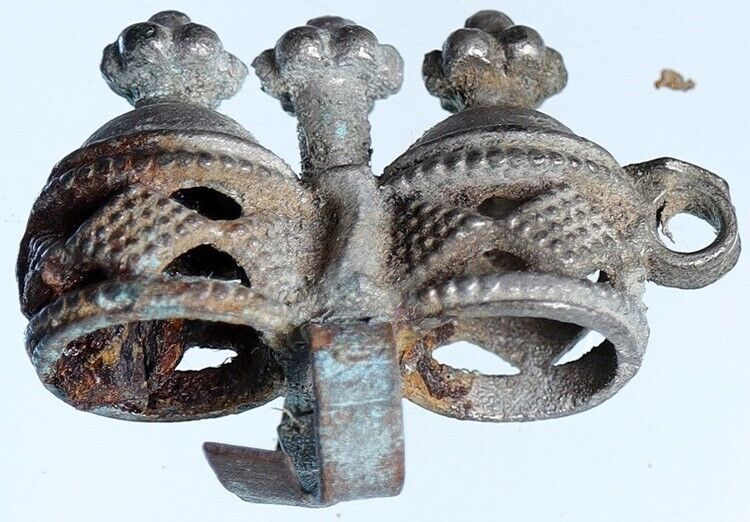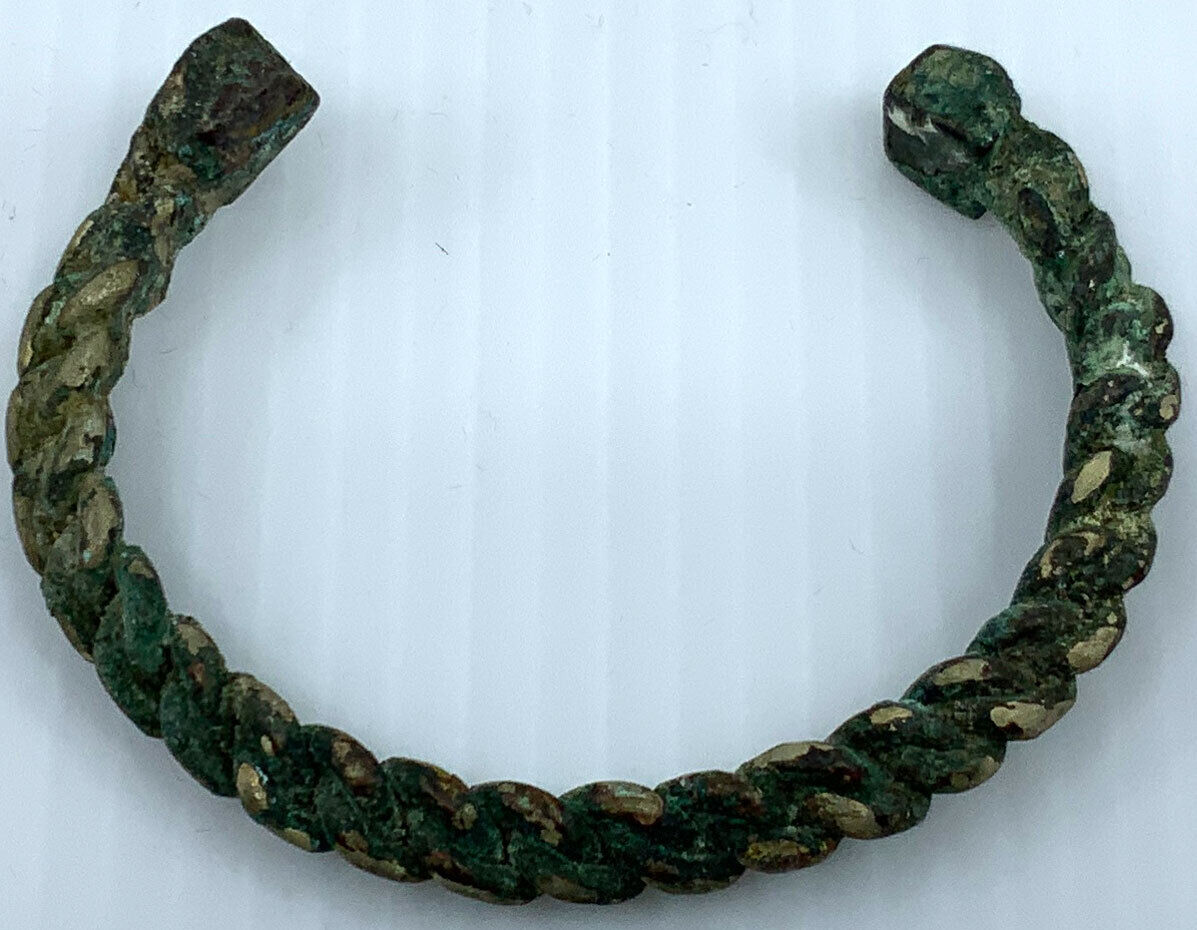|
Bronze Roman Vagina Shaped Fertility Amulet Pendant Talisman from circa 100 B.C. – 200 A.D.
Bronze measuring 4.1 x 2.5 x 2.2 centimeters and weighs 22.62 grams
The ancient Roman woman who wanted to be pregnant, would wear such an amulet to help her achieve this. This amulet was a symbol of fruitfulness and fertility. There are three loops around the pendant which allowed it to be worn around the neck on a string or chain. There were many fertility gods and goddesses to which the Romans prayed. This was an important subject, especially in ancient times and symbols of fertility and plenty were often used. Take as an example the prevalent use of Venus in statue for, goddess of fertility, sex, love and beauty in Roman statuary and mosaics, and even coins. Having done further research looking through various literature on the subject, I have not yet come across a published example in my extensive library. This makes this type of fertility charm of the extremely rare variety.
You are bidding on the exact item pictured, provided with a Certificate of Authenticity and Lifetime Guarantee of Authenticity.
A talisman is an object which is believed to contain certain magical or sacramental properties which would provide good luck for the possessor or possibly offer protection from evil or harm.
According to the Hermetic Order of the Golden Dawn, a magical order active in the United Kingdom during the late-19th and early-20th centuries, a talisman is “a magical figure charged with the force which it is intended to represent. In the construction of a talisman, care should be taken to make it, as far as possible, so to represent the universal forces that it should be in exact harmony with those you wish to attract, and the more exact the symbolism, the easier it is to attract the force.”
An amulet is an object whose most important characteristic is the power ascribed to it to protect its owner from danger or harm. Amulets are different from talismans as a talisman is believed to bring luck or some other benefit, though it can offer protection as well. Amulets are often confused with pendants�”charms that hang from necklaces�”any given pendant may indeed be an amulet, but so may any other charm which purports to protect its owner from danger.
Potential amulets include gems, especially engraved gems, statues, coins, drawings, pendants, rings, plants, and animals; even words in the form of a magical spell or incantation to repel evil or bad luck.
The word “amulet” comes from the Latin amulētum; the earliest extant use of the term is in Pliny’s Natural History, meaning “an object that protects a person from trouble”.
Fertility Gods and Goddesses of Roman mythology
- Bona Dea, goddess of fertility, healing, virginity, and women
- Candelifera, goddess of childbirth
- Carmenta, goddess of childbirth and prophecy
- Ceres, goddess of agriculture, grain crops, fertility and motherly relationships; equated with the Greek goddess Demeter
- Diana, goddess of the hunt, wilderness, the moon and childbirth; equivalent to the Greek Artemis
- *Domidicus, the god who leads the bride home
- *Domitius, the god who installs the bride
- Fascinus, embodiment of the divine phallus
- Fecunditas, goddess of fertility
- Feronia, goddess associated with fertility and abundance
- Flora, goddess of flowers and spring
- Inuus, god of sexual intercourse
- *Jugatinus, the god who joins the pair in marriage
- Juno, goddess of marriage and childbirth; equivalent to the Greek goddess Hera
- Liber, god of viniculture, wine and male fertility, equivalent to Greek Dionysus; in archaic Lavinium, a phallic deity
- Libera, goddess of female fertility and the earth
- Lucina, goddess of childbirth
- Mars, god initially associated with fertility and vegetation, but later associated with warfare and the Greek god Ares
- *Manturna, the goddess who kept the bride at home
- Mutunus Tutunus, phallic marriage deity associated with the Greek god Priapus
- Ops, fertility and earth-goddess
- Partula, goddess of childbirth, who determined the duration of each pregnancy
- *Pertuda, goddess who enables penetration
 Venus, Roman goddess of love, beauty and fertility Venus, Roman goddess of love, beauty and fertility
- Picumnus, god of fertility, agriculture, matrimony, infants and children
- *Prema, goddess who holds the bride down on the bed
- Robigus, fertility god who protects crops against disease
- *Subigus, the god who subdues the bride to the husband’s will
- Terra, earth goddess associated with marriage, motherhood, pregnant women, and pregnant animals; equivalent to the Greek Gaia
- Venus, goddess of love, beauty and fertility, equivalent to the Greek goddess Aphrodite
- *Virginiensis, the goddess who unties the girdle of the bride
* These 8 gods/goddesses consummate marriage and some of them are listed in the Indigitamenta
|










 Venus, Roman goddess of love, beauty and fertility
Venus, Roman goddess of love, beauty and fertility




